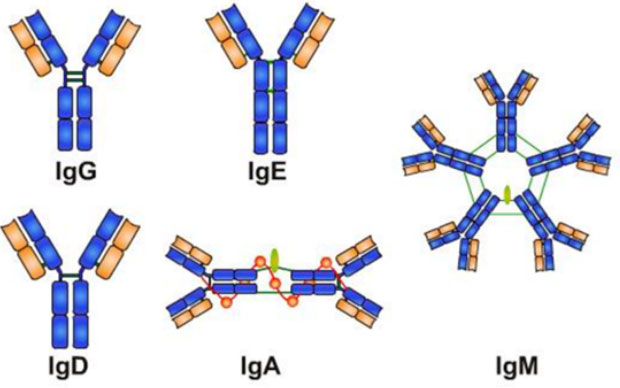When we go to the hospital for tests, we often see test items beginning with Ig on the laboratory sheet, such as IgE and IgA, which make us confused. In fact, these are the immunoglobulins in our bodies. So, what immunoglobulins do we have? What do they do in our bodies? What is the diagnostic significance of abnormal indicators?
Immunoglobulin (Ig) is a group of globulins with antibody activity synthesized and secreted by plasma cells, which exist in our body's blood, body fluids, exudates and the membranes of some cells. Immunoglobulins are divided into IgG, IgA, IgM, IgD and IgE because of their different functions and physicochemical properties. Ig plays an extremely important physiological function, and the content of Ig in serum and body fluids may change with the progression of the disease. The combination of abnormal changes and clinical manifestations of Ig is helpful for the differential diagnosis, therapeutic effect monitoring and prognosis judgment of infectious diseases, immunoproliferative diseases and immunodeficiency diseases. Hipro Biotechnology offers professional wholesale autoimmunity test products for doctors and patients to get their own immunity levels.

Immunoglobulin G is the most abundant and the most important Ig in human body, accounting for 70% ~ 80% of the total immunoglobulin, which is a reimmune response antibody. Immune globulin blood test can help evaluate immune functions.
(1) IgG increase: common in various chronic infections, chronic liver disease, collagen vascular disease, lymphoma and autoimmune diseases such as systemic lupus erythematosus (SLE), rheumatoid arthritis; Simple IgG increase is mainly seen in immunoproliferative diseases, such as IgG-secretory multiple myeloma (MM).
(2) IgG reduction: seen in patients with congenital and acquired humoral immunodeficiency, combined immunodeficiency, heavy chain disease, light chain disease, nephrotic syndrome, viral infection and immunosuppressive agents. It can also be seen in metabolic diseases such as hyperthyroidism and muscular dystrophy.
Immune globulin A test can help evaluating the content of immunoglobulin A in human serum.
(1) IgA increase: seen in IgA MM, SLE, rheumatoid arthritis, liver cirrhosis, eczema and kidney diseases; In toxic liver injury, IgA concentration is positively correlated with the degree of inflammation.
(2) IgA reduction: seen in recurrent respiratory tract infections, non-iga MM, heavy chain disease, light chain disease, primary and secondary immunodeficiency diseases, autoimmune diseases and metabolic diseases (such as: hyperthyroidism, muscular dystrophy).
Immunoglobulin M is the Ig in the primary immune response. IgM is the earliest antibody in ontogeny or when the body is stimulated by antigen. The igm test kit can help evaluate the content of Immunoglobulin M (IgM) in human serum.
(1) IgM increase: in early viral hepatitis, liver cirrhosis, rheumatoid arthritis, SLE, etc. Intrauterine infection may cause a sharp increase in IgM concentration. If IgM in cord blood is >0.2g/L, intrauterine infection is indicated. In addition, IgM was significantly increased monoclonal in primary macroglobulinemia.
(2) IgM reduction: seen in IgG heavy chain disease, IgA MM, congenital immunodeficiency, immunosuppressive therapy, lymphatic system tumors, nephrotic syndrome and metabolic diseases (such as hyperthyroidism, muscular dystrophy).
Immunoglobulin E is the least Ig in serum, accounting for about 0.002% of the total Ig in serum. It is the antibody that mediates 1 type allergy, and allergy, parasite infection and skin allergy are concerned. Contact with us to know more about ige test price.
(1) IgE increase: seen in IgE type MM, heavy chain disease, liver disease, sarcoidosis, rheumatoid arthritis, specific dermatitis, allergic asthma, allergic rhinitis, interstitial pneumonia, urticaria, eosinophilia, dermatitis herpetiform, parasitic infection, bronchopulmonary aspergillosis and other diseases.
(2) IgE reduction: seen in congenital or acquired gamma globulin deficiency, malignant tumors, long-term use of immunosuppressive agents and ataxia telangiectasia.
When a man is cured of an infectious disease, he never gets it again. This kind of immunity is acquired, because naturally infected with a certain pathogenic microorganism, after recovery, the body automatically produces antibodies.
By artificially infecting people with a very virulent pathogen, such as vaccination, they automatically acquire resistance to a disease.
An infant's immunity to the mother's body. At six months, the baby's immune system has not yet developed, but it rarely gets sick, because the fetus's blood circulation is connected to the mother, and the mother's resistance is injected into the fetus through the blood.
Injection of immunoglobulin, or oral nutrition containing high content of immunoglobulin, so that the body to obtain relevant immunity, so as to shorten the course of disease, reduce the frequency of illness.
A. Adults or children who are prone to recurrent infections;
B. Diagnosis and follow-up of autoimmune diseases or atopic reactive diseases: such as asthma, allergic diseases, idiopathic eczema, type I diabetes mellitus, essential thrombocytopenic purpura, SLE, Sjogren's syndrome, rheumatoid arthritis, vasculitis and other diseases;
C. Immunodeficient population: such as bone marrow transplantation, HIV infection, viral infection, IgA deficiency or IgM deficiency, common variant immunodeficiency disease, radiation injury, chemotherapy, etc., may have different subtypes of defects;
D. Other chronic diseases: chronic kidney diseases, nervous system diseases, hematological diseases, tumors, etc., may show immunoglobulin abnormalities.